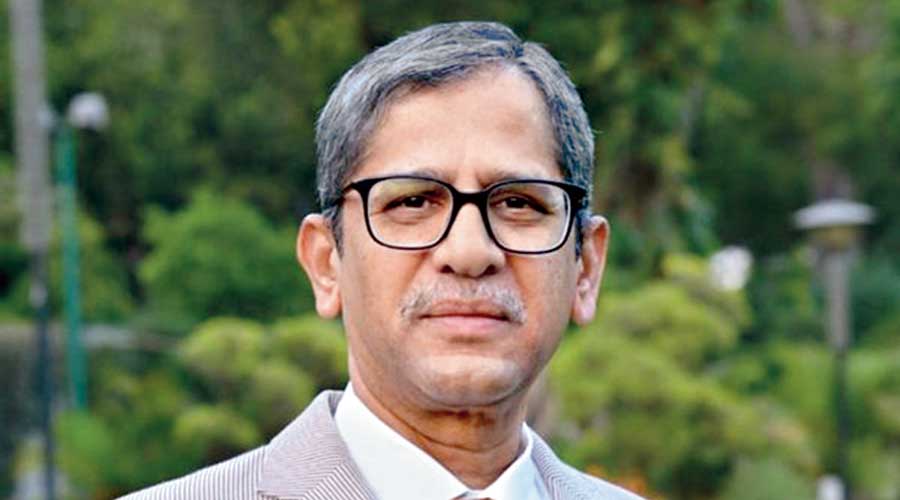The Supreme Court on Wednesday castigated the Centre after attorney-general K.K. Venugopal asserted that the government had the right to reject names recommended for various tribunals.
Chief Justice of India N.V. Ramana reminded the Centre that India is a “democratic country following the rule of law” and the executive cannot “cherry-pick” names.
Tribunals are adjudicatory quasi-judicial bodies set up with retired judges to decongest the regular courts and deal with specialised issues. The selection committees for tribunals have sitting judges of the Supreme Court as members along with other nominees.
The special bench, also having Justices D.Y. Chandrachud and L. Nageswara Rao, granted two weeks to the Centre to clarify its position on filling up 250-odd vacancies in various quasi-judicial tribunals such as the National Company Law Tribunal (NCLT), National Company Law Appellate Tribunal (NCLAT), Income Tax Appellate Tribunal (ITAT), Telecom Disputes Settlement Appellate Tribunal (TDSAT) and the Debt Recovery Tribunal (DRT) or face a judicial order.
The court was dealing with petitions filed by the Madras Bar Association and Congress leader Jairam Ramesh challenging the constitutional validity of various provisions of the Tribunal Reforms Act, 2021. The petitioners have contended that the legislation is an attempt to scuttle the apex court’s earlier judgments upholding the independence of the tribunals.
After the NDA government came to power in 2014, there has been constant friction between the judiciary and the executive over the appointment process of judges to the Supreme Court and the high courts.
A thaw in the relationship had appeared to have set in between the executive and the judiciary after the Centre recently cleared the names of many judges recommended by the Supreme Court collegium.
The top court is now deeply disturbed by the large number of vacancies in the tribunals as some of the recommendations had been made more than a year ago.
“I have seen the selection list of the NCLT. The selection committee recommended nine judicial members and 10 technical members. The appointment indicates cherry-picking of three names from the select list and others from the waitlist, ignoring others in the select list. In service law, you can’t go to the waitlist ignoring the select list. What kind of appointment is this?” CJI Ramana asked Venugopal.
Venugopal submitted that “…the government has the power not to accept the recommendations made…”.
Justice Ramana replied: “We are in a democratic country following the rule of law. It is under the Constitution that we are working. You (the Centre) cannot say that.”
Venugopal cited certain earlier judgments relating to the UPSC selection process where the apex court had stated that the government was not bound to select the recommended names.
Venugopal maintained that the government had exhausted the main list of recommended candidates and, thereafter, gone to the waiting list. He said there were no recommendations pending from the selected list of main candidates for at least 15 tribunals.
Justice Ramana said: “We are very much unhappy with the way the things are going on and how the decisions are taken. I am also one of the persons and part of the selection committee for the NCLT. We have interviewed 534 candidates for judicial posts and 400 others for technical posts. Out of that, we gave names of 10 judicial members in the list and 11 technical members…. But they (the government) have selected only four judicial members and then gone to the waitlist.”
He added: “We travelled across the country. The corporate affairs secretary and the law secretary were there. Another (Supreme Court) judge, Justice Surya Kant, was there. This is a waste of time for us then. We spent a lot of time during Covid. Your government requested us to conduct interviews as early as possible. So we did…. There is no consistency. I am sorry I don’t know why you want to bring trouble in all these matters. It is very unfortunate. The government has to realise this.”
Justice Rao pointed out that the selection committee had made recommendations for the TDSAT more than a year ago, but the appointments had not been finalised till date.
Venugopal said the government wanted some of the names to be reconsidered.
Senior advocate Arvind Datar, appearing for the Madras Bar Association, said there was also a “disturbing trend, which needs to end”.
According to Datar, the government has notified new rules for appointment of members to various tribunals under which the tenure is now for four years or till they reach 67 years or “until further orders”. He took exception to the clause “until further orders”, saying it could be misused by the government to remove members of tribunals arbitrarily.











